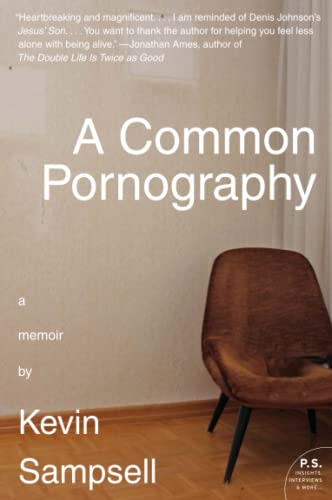
That's an image representing Aaron Burch's new book, How To Take Yourself Apart, How To Make Yourself Anew out now from Pank. It details how to take yourself apart.
That image is all I got b/c I forgot to ask Aaron for a photo. In addition to that chapbook, you probably know Aaron for his work with Hobart, one of the coolest & distinctive lit journals out. Read that, but you probably do already.
Here are the 5 best things Aaron Burch has read recently...

1. A Common Pornography by Kevin Sampsell
I've known Kevin for years, both being Northwest indie lit peeps, though Kevin obviously much, much more so than I. But, anyway. I've read his stories and small press books over the years and, as much as I've enjoyed pretty much all of it, my fave was always his short memoir-type thing, A Common Pornography. So... I've been excited about this expanded/reenvisioned book ever since I heard it announced and it did not at all disappoint. I really don't want to overstate, but I think this might have been my favorite memoir I've ever read.
2. Zachary Schomburg's book of poetry, Scary, No Scary. And, specifically, the index.
First of all, how many poetry books have indexes? OK, maybe practically all of them; I don't know, I don't really read much poetry. But, a real "index," not just a reference of "first lines" like I've seen a handful of times. Also, Schomburg's index is like it's own poem, with entries like: "Compression (specifically the idea of being crushed into a tiny cube)" and "Infinity, or a very long time."
2a. My love for Schomburg's poems, despite my fiction prejudice, has reminded me of two other recent poem loves, which I would feel remiss if I didn't mention: "In the Desert" by Stephen Crane, and "Alien v. Predator" by Michael Robbins. I translate the Bible into velociraptor, indeed.
3. The About A Mountain excerpt by John D'Agata in The Believer
I also just read this whole book (back-to-back nonfiction books) and as much as I liked and enjoyed and appreciated it, and as well-written, and etc. etc. as it is, I think I preferred the excerpt in The Believer. I don't know... it seemed more focused and, obviously, concentrated. And I really liked how it played with the structure and the 9 numbered sections. And some of what I'll call D'Agata's "moves" (I was originally, when I started thinking about this list a week or three ago, going to include this blog post on my list of 5, but now some time has passed and I have some new good stuff to pimp) that I loved so much in the excerpt ended up feeling repetitive and less interesting in the longer format. That said, the book was great and I read it in two, maybe three, sittings, which obviously says a lot. But, still. I recommend the Believer excerpt.

4. The Dark Knight Returns analysis on bigother.com
In-depth graphic novel analysis? Superbly written, with tons of examples, etc. Makes me want to go back and reread The Dark Knight Returns all over again.
5. The most recent quote I got to print the next Short Flight / Long Drive minibook.
The first quote I got, from a printer that I knew prefers not to print smaller, "odd-sized" books, left me gasping for air. I thought I was going to have to go crazy into debt and maybe even give up the goal of publishing books. But then another quote request came through and, at almost a third of the price, I am still sighing. Easily one of the best things I've "read" in a long time. Phew.
5a. The next minibook: The Avian Gospels by Adam Novy.
I hate to use this to just mention a book I'm editing and publishing, but I got the above-mentioned quote because we're getting ready to print this thing, which means I've been reading it yet again, working on edits, etc. and... hot damn. This book is amazing. I can't wait for people to read it.
More after the jump...




































